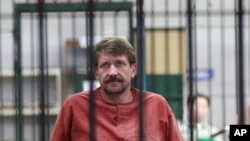Jurors at the New York trial of a former Soviet Air Force officer and alleged international arms dealer are getting an inside look at the secretive world of illegal arms dealing.
Russian businessman Viktor Bout is accused of conspiring to sell thousands of military-grade weapons, including surface-to-air-missiles, that he believed would be used to kill American pilots in Colombia, among others. He was arrested in Thailand in 2008 after meeting with confidential U.S. informants posing as Colombian rebels from FARC, a group listed by the U.S. as a terrorist organization. He has pleaded not guilty.
Douglas Farah is author of “Merchant of Death,” about Bout’s career as what he portrays is the most prolific illegal arms merchant ever. Farah says it began when the Soviet Union collapsed in 1991, and Bout, a former Soviet Air Force officer, gained access to unused cargo planes and weapons.
“He moved literally millions and millions of rounds of ammunition, he moved hundreds of thousands of AK-47s. In the pre-Viktor Bout era in Africa, if you wanted to buy AK-47s, you could, there were a lot of people who could provide you with 50, 100. But very few people could provide anti-tank systems, anti-aircraft systems, attack helicopters, put them on an airplane and deliver them within a matter of weeks,” Farah said.
Farah said the result was far deadlier wars in Rwanda, Congo and Sierra Leone, for example. Kathi Austin, a former arms trafficking expert for the United Nations, has been at Bout’s trial from the first day. She says Bout initiated some conflicts, by offering sophisticated arms to warlords in exchange for diamonds and other natural resources.
“They were changing the face of war in those countries, where most of the victims became civilians rather than armies and rebel groups fighting against one another. And an arms trafficker like Viktor Bout actually went so far as to initiate conflict in certain areas, just to make a profit,” Austin said.
Austin says the trial promises to reveal both the scope and details of Bout’s operations - in part through hours of wiretapped recordings of meetings and phone calls with Bout and his associates. “The general public now, through the course of the trial, is learning intimate details of how an entire illegal arms deal is put together, from the supply to the trans-shipment point, all the way to the end-user recipient,” she said.
Carlos Sagastume, the first confidential U.S. informant to testify, stated that - as heard on a wiretap played in the courtroom -- Bout advised FARC (Revolutionary Armed Forces of Colombia
Fuerzas Armadas Revolucionarias de Colombia - FARC ) to buy a bank in which to launder drug money and weapons payments. Bout also can be heard on the tapes telling the agents he thought were FARC rebels to set up different companies to mask their activity, and offering them weapons training, and help falsifying documents to cover the weapons sales.
Sagastume also testified that - as heard on a wiretap recording played for the jury -- Bout said that he and FARC had the same “enemy.” His testimony will continue.
A U.N. Security Council resolution from 2004 asked member states to refuse Viktor Bout transit and to freeze his assets. Bout’s lawyer, Albert Dayan, told the court that $6 billion of Bout’s assets was subsequently frozen. He said he plans to call no witnesses.
Trial of Alleged Russian Arms Trafficker Offers Rare Glimpse of a Shadowy Trade











